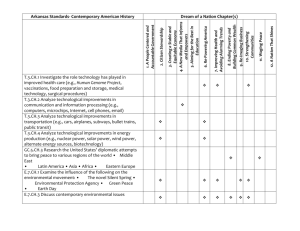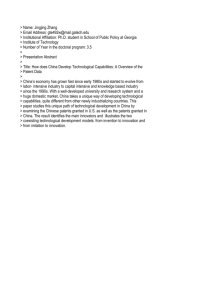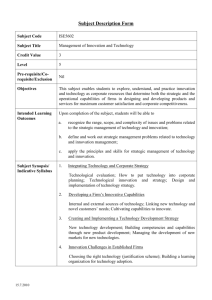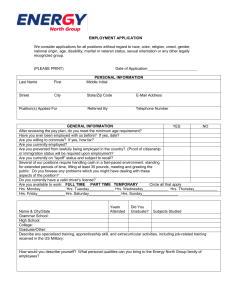ISE5017 - Department of Industrial and Systems Engineering
advertisement
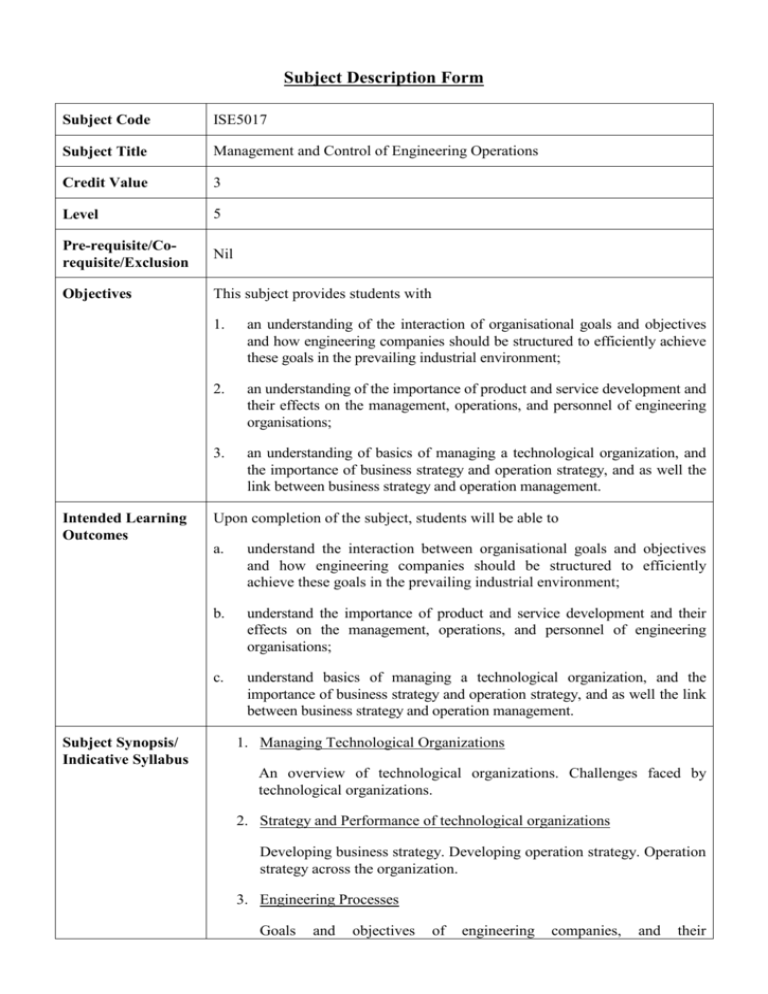
Subject Description Form Subject Code ISE5017 Subject Title Management and Control of Engineering Operations Credit Value 3 Level 5 Pre-requisite/Corequisite/Exclusion Nil Objectives This subject provides students with Intended Learning Outcomes Subject Synopsis/ Indicative Syllabus 1. an understanding of the interaction of organisational goals and objectives and how engineering companies should be structured to efficiently achieve these goals in the prevailing industrial environment; 2. an understanding of the importance of product and service development and their effects on the management, operations, and personnel of engineering organisations; 3. an understanding of basics of managing a technological organization, and the importance of business strategy and operation strategy, and as well the link between business strategy and operation management. Upon completion of the subject, students will be able to a. understand the interaction between organisational goals and objectives and how engineering companies should be structured to efficiently achieve these goals in the prevailing industrial environment; b. understand the importance of product and service development and their effects on the management, operations, and personnel of engineering organisations; c. understand basics of managing a technological organization, and the importance of business strategy and operation strategy, and as well the link between business strategy and operation management. 1. Managing Technological Organizations An overview of technological organizations. Challenges faced by technological organizations. 2. Strategy and Performance of technological organizations Developing business strategy. Developing operation strategy. Operation strategy across the organization. 3. Engineering Processes Goals and objectives of engineering companies, and their interrelationships with the management process. The impact of globalisation and the technical, economic, and cultural challenges faced by organisations. 4. Planning and Controlling of Engineering Operations Different planning tools and techniques; common control systems including system design, capacity, and inventory control systems; management by objectives. 5. Productivity The importance of productivity in engineering companies. Total and partial productivity, and their measurement, use, and limitations. Teaching/Learning Methodology Emphasis is placed on a student-centred learning approach (in some cases through problem-based learning). A variety of case studies carried out in syndicate groups are assessed through class presentations supported by management reports. These case studies are used to deliver the subject material and integrate the topics contained in the syllabus to make the subject material more interesting and meaningful to students. Lectures are used only to introduce the cases and set the scenarios for the syndicate groups. Some cases are then supplemented by drip feeding of information, and covering areas that have not been identified by students during the case discussions. Assessment Methods in Alignment with Intended Learning Outcomes Specific assessment methods/tasks % weighting Intended subject learning outcomes to be assessed a b c 1. Continuous assessment 45% 2. Exam 55% Total 100% Continuous assessment includes assignments, case studies, laboratory sessions and tests that are designed to facilitate students to reflect on and apply the knowledge learnt throughout the course. Student Study Effort Required Class contact: Lectures 30 Hrs. Case Studies/Laboratory work/Tests 12 Hrs. Other student study effort: Revision 42 Hrs. Self-study 42 Hrs. Total student study effort 126 Hrs. Reading List and References 2. R. Dan Reid, Nada R. Sanders, Operations Management: An Integrated Approach, 4th Edition, January 2010 3. Christopher, William F. and Thor, Carl G. (Ed.) 1993, Handbook for Productivity Measurement and Improvement, Productivity Press 4. Krajewski, Lee J., Ritzman, Larry P. and Malhotra, Manoj K. 2010, Operations Management: Processes and Supply Chains, Prentice Hall 5. Silver, Edward A. 1998, Inventory Management and Production Planning and Scheduling, Wiley 6. Toomey, John W. 2000, Inventory Management: Principles, Concepts and Techniques, Kluwer Academic Publishers 7. Schermerhorn, J.R. Jr., Introduction to Management, 10th Ed., Wiley, 2010.
